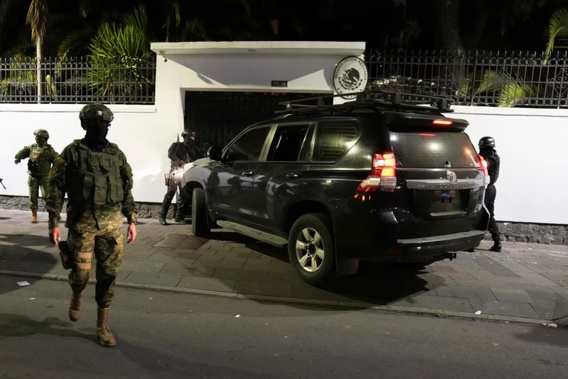
Diplomatic relations between Mexico and Ecuador dramatically imploded after Ecuadorian police burst into Mexico’s Embassy in Quito and arrested Jorge Glas, Ecuador’s former Vice President.
Glas, arrested late Friday local time, had been convicted on charges of bribery and corruption and remains under investigation for other potential crimes. Following the arrest, leaders from across the Americas voiced outrage at the incident and Mexico’s president announced he was breaking diplomatic ties with Ecuador.
But in a region that’s no stranger to political explosions, what has provoked such fierce outrage?
International law experts and leaders across the region have said that the move violated long-established international laws that few rulers have dared to breach. It’s almost an unprecedented act. To date, there are only a tiny handful of cases of raids on embassies on the books.

Police attempt to break into the Mexican Embassy in Quito, Ecuador, on April 5 following Mexico's granting of asylum to former Ecuadorian Vice President Jorge Glas. Police later forcibly broke into the embassy through another entrance. Photo / AP
By forcing their way into the Mexican Embassy to make the arrest, Ecuadorian police effectively intruded onto Mexican sovereign territory, said Natalia Saltalamacchia, a professor on international relations at the Autonomous Technological Institute of Mexico. Mexican President Andres Manuel Lopez Obrador called the break-in “a flagrant violation of international law and the sovereignty of Mexico”.
The law Saltalamacchia, Lopez Obrador and other leaders are citing is an accord dating back to 1963 known as the Vienna Convention on Consular Relations. It sets out clear rules on “diplomatic immunity”, which effectively blocks authorities from entering embassies by force, among other things.
By injuring diplomatic personnel within the embassy, Saltalamacchia said, Ecuador’s Government violated another section of the accords.
“When a state like Ecuador makes decision like that, you’re really endangering all the embassies of all the states in the world” by ignoring precedent, Saltalamacchia said. “You enter into a state of anarchy, a sort of jungle law.”
Such rules have been established to maintain healthy diplomatic relations around the world, and allow diplomats to carry out their work without fear of retribution. The United States State Department notes that diplomatic immunity exists to “ensure the efficient and effective performance of their official missions on behalf of their governments”.

A supporter of former Ecuadorian Vice President Jorge Glas protests as a military vehicle transports him from the detention centre where he was held following his arrest at the Mexican Embassy in Quito Ecuador. Photo / AP
The Friday night local time raid is a move even the region’s most-criticised governments have hesitated to take, and something Ecuador’s own Government once declared illegal.
Most notably - and rather ironically - the British Government threatened to raid Ecuador’s Embassy in 2012 to go after WikiLeaks leader Julian Assange, who was seeking asylum in Ecuador.
“We are deeply shocked by the British Government’s threats against the sovereignty of the Ecuadorian Embassy and their suggestion that they may forcibly enter the embassy,” said Ecuador’s Government at the time. “This is a clear breach of international law and the protocols set out in the Vienna Convention.”
British authorities never made good on their threat, and only a few examples of actual violations have been documented in recent decades.
Saltalamacchia cited the takeover of the American Embassy in Iran in 1979, when diplomats were held hostage for 444 days. In Cuba, in 1956 before the Vienna Convention was agreed, nine people were killed in Haiti’s Embassy as a result of a raid by Cuban police under the Batista dictatorship.

Mexican police stand guard outside the Ecuadorian Embassy, in Mexico City. The Mexican president moved to break off diplomatic ties with Ecuador after police broke into the Mexican Embassy in Quito to arrest a former vice president who had sought political asylum there. Photo / AP
In 1981, Cuba carried out another raid on Ecuador’s Embassy to capture a number of officials seeking political refuge status.
The Organisation of American States also compared this week’s break-in to a 2022 incident when Nicaraguan authorities “illegitimately occupied” their own offices in Managua. The OAS also called for a meeting to discuss the Ecuador incident.
While embassies have also been attacked and raided in countries including Lebanon, Argentina, Libya, Indonesia and Thailand, those raids were carried out largely by insurgent groups.
Saltalamacchia said that by arresting Glas, Ecuador’s Government may have also violated a regional agreement known as the 1954 Convention on Diplomatic Asylum, which allows individuals to seek asylum in embassies.

Police stand guard at the entrance of the penitentiary where former Vice President Jorge Glas is being held, in Guayaquil, Ecuador. Photo / AP
However, some have defended Ecuador.
Former Ecuadorian ambassador Jorge Icaza told the Associated Press that while he agreed that entering the embassy was illegal, he added it was improper to protect “a criminal who was sanctioned by the Ecuadorian justice (system) in two very evident cases, which is also negative from the point of view of international standards”.
Ecuador’s presidency also alleged that Mexico’s Government had “abused immunities and privileges granted to the diplomatic mission”, and granted “diplomatic asylum contrary to the conventional legal framework”.
- AP
Take your Radio, Podcasts and Music with you









